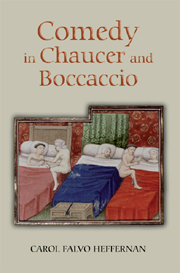Book contents
- Frontmatter
- Contents
- In memory Of Thomas Farel Heffernan 1933–2009
- Preface and Acknowledgments
- 1 Introductory matters
- 2 The Comic Inheritance of Boccaccio and Chaucer
- 3 Parallel Comic Tales in the Decameron and the Canterbury Tales
- 4 Antifraternal Satire in Boccaccio and Chaucer
- 5 Adding Comedy: Boccaccio's Filostrato and Chaucer's Troilus and Criseyde
- Conclusion
- Bibliography
- Index
- Chaucer Studies
3 - Parallel Comic Tales in the Decameron and the Canterbury Tales
Published online by Cambridge University Press: 12 September 2012
- Frontmatter
- Contents
- In memory Of Thomas Farel Heffernan 1933–2009
- Preface and Acknowledgments
- 1 Introductory matters
- 2 The Comic Inheritance of Boccaccio and Chaucer
- 3 Parallel Comic Tales in the Decameron and the Canterbury Tales
- 4 Antifraternal Satire in Boccaccio and Chaucer
- 5 Adding Comedy: Boccaccio's Filostrato and Chaucer's Troilus and Criseyde
- Conclusion
- Bibliography
- Index
- Chaucer Studies
Summary
While the indebtedness of Chaucer's versified comic tales to thirteenth-century French fabliaux has been closely studied by scholars, their relationship to the prose tales of Boccaccio's Decameron has been studied less and with greater reservation. The relationship between the comic tales of Chaucer and Boccaccio deserves more attention, at least as much as that given to the English poet's tales and the French fabliaux. Many of the French antecedents are judged to be “lost”; whereas, Boccaccio's tales are there for the reading and it is increasingly clear that Chaucer knew them. Even when the relationships between the English and Italian comic tales turn out to be more those of analogues than of sources and derivatives, much can be learned from a comparative examination of style. This chapter begins with a consideration of the first two English fabliaux told in Fragment I of the Canterbury Tales, Chaucer's Miller's Tale and Reeve's Tale, and their possible links to Boccaccio's Decameron. They are the comic tales that Chaucer's readers encounter first and remember best. The chapter then turns to two of Chaucer's comic tales assumed to have French fabliaux sources, the Shipman's Tale and the Merchant's Tale. The evidence of the influence of the Italian novella – especially novellas of Boccaccio's Decameron – suggests that the novellas deserve the same status as sources or close analogues as do the French fabliaux.
- Type
- Chapter
- Information
- Comedy in Chaucer and Boccaccio , pp. 38 - 71Publisher: Boydell & BrewerPrint publication year: 2009



